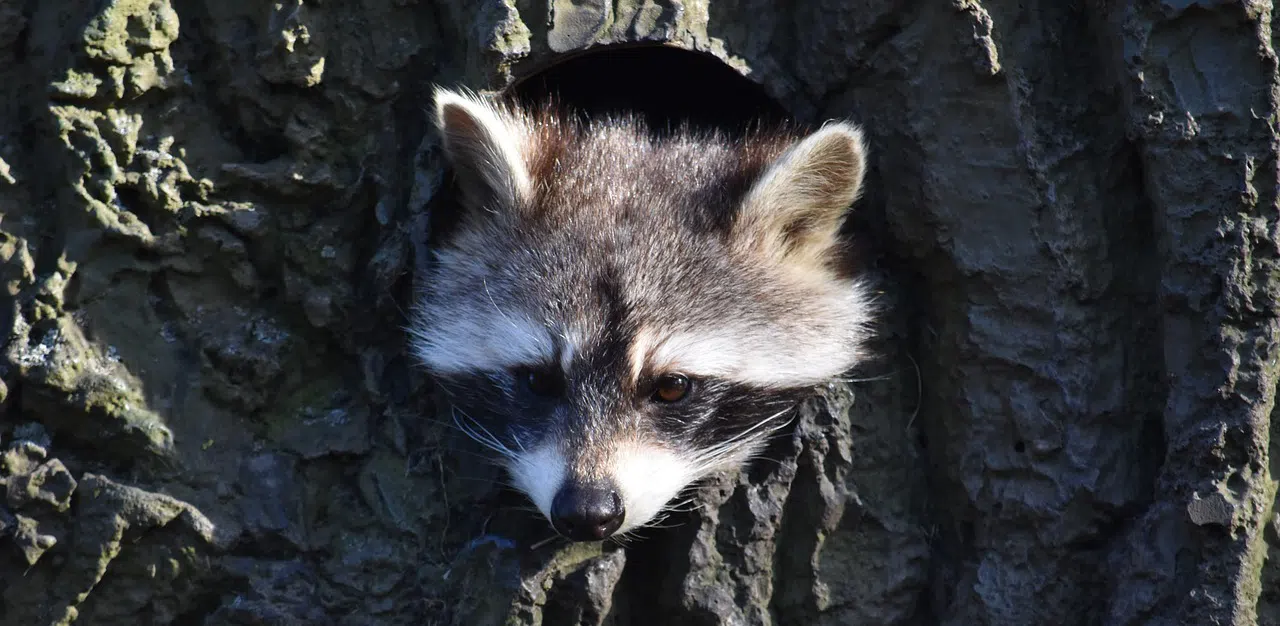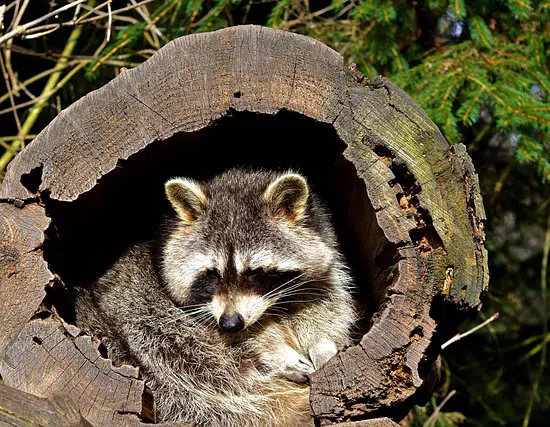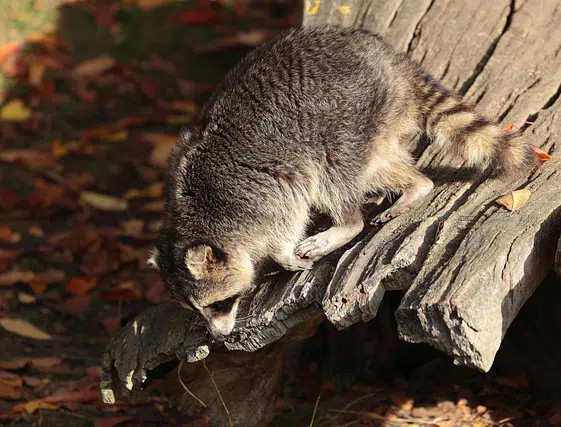We know Toronto has been dubbed "Raccoon Capitol of the World" but communities all across the GTA are also experiencing Increased raccoon nesting in attics, chimneys, under decks, and garages. With summer being prime time for juvenile raccoons stepping out into the world and seeking adventures, now is a great time to get rid of existing dens on your property and get serious about raccoon control in Toronto.

Many homeowners don't realize that raccoon nesting (or denning) equals long-term infestation risk, extensive property damage and serious health hazards.
Where and How Raccoons Build Their Nests
Here’s how to find a raccoon den:
-
Indoor Nest Locations:
-
Attics or crawl spaces (especially in insulation or dark corners)
-
Chimneys without proper caps
-
Wall voids or dropped ceilings in garages, sheds, or commercial spaces
-
-
Outdoor Den Locations:
-
Under decks or porches
-
Inside sheds, behind HVAC units, or under staircases
-
In commercial dumpsters or rooftop ductwork
-
In or on abandoned machinery
-
-
Signs of a Raccoon Den Nearby:
-
Flattened insulation or debris piles
-
Torn paper, leaves, plastic bags, attic insulation, etc.
-
Droppings nearby and a strong, musky odour
-
Visible baby raccoons (kits)
-
Challenges of Raccoon Nest Removal
- Unseen Entry Points
- Raccoons may enter through gaps in soffits, vents, shingles, siding, or commercial rooftop openings.
- Homeowners often patch visible entry points and leave others open, allowing the animals to return.
- Dealing with Baby Raccoons (Kits)
- Most nests contain kits during spring and summer.
- Newborn kits are silent, immobile, and hidden—removing the mother raccoon and/or the nest alone leaves the babies to die of starvation, causing new issues (decomposition, odor, and insect infestation).
- Aggressive Adult Raccoons
- A mother raccoon will defend her nest aggressively.
- Homeowners attempting to enter attics or crawlspaces risk bites, scratches, and exposure to disease such as rabies, roundworm, or other parasites.
- Limited Accessibility
- Nests are often located in tight, high up, or dangerous spaces— under roofs, behind walls, or in narrow crawlspaces.
- Many homeowners don’t have the proper safety gear, tools, disinfectants, or ladders to investigate or get rid of a raccoon nest safely.
- Legal & Ethical Limits
- It is illegal to trap and relocate wildlife farther than 1 km from the capture site in Ontario.
- Inexperienced trappers may remove adult raccoons, but leave kits behind.
Why DIY Nest Removal Often Fails or Backfires
- Common Mistakes:
- Blocking the entrance while raccoons are still inside causes structural damage or panicked animals breaking through walls.
- Removing only the mother leaves kits behind to die or forces the mother to frantically tear through the roof to get back to her young.
- Attempting to “scare them out” with lights, radios, or repellents may result in raccoons moving deeper, becoming aggressive, or it may have no impact at all.
- Cleanup is Usually Overlooked:
- Raccoon nesting sites are filled with urine, feces, parasites, soaked lumber, and contaminated insulation.
- Structural weakening due to compromised floors, walls, or supports.
- DIYers rarely disinfect or decontaminate as thoroughly as is necessary —risking ongoing odor, mold, and airborne health hazards.
What the Law Says About Raccoon Den Removal
- It is Illegal in Canada to:
- Use poison to eliminate raccoons or other wildlife.
- Relocate a trapped raccoon more than 1 km away.
- This 1km Rule Exists to:
- Prevent the spread of disease over large areas.
- Promote survival of the relocated animal(s) and prevent disruption to wildlife populations.
- Most raccoon control or other wildlife removal companies in the GTA are only licensed for exclusion—not for euthanasia or permanent removal.
Hawkeye’s Permanent Raccoon Nest Removal Is Different
- Hawkeye is the only private company offering permanent raccoon removal in the GTA.
- Hawkeye is licensed by the Ministry of Natural Resources and Forestry (MNRF) to trap and humanely euthanize raccoons.
- Our Permanent Raccoon Removal Process:
- The raccoon is not relocated—it is permanently removed to prevent return.
- We ensure no kits are left behind, and no re-entry is possible.
- Benefits:
- Legally compliant
- Humane and effective
- Removed raccoons are guaranteed not to return
- Faster resolution than repeated one-way door attempts
What Happens After a Nest Is Removed?
- Nest Cleanup & Disinfection:
- Removal of all nesting material, feces, and contaminated insulation or other materials
- Sanitation to eliminate odor, roundworm eggs, fleas, and parasites
- Structural Repair & Prevention:
- Seal all entry points and reinforce vulnerable areas
- Install raccoon-proof chimney caps and metal mesh
 Common Questions About Raccoon Nest Removal
Common Questions About Raccoon Nest Removal
Q: Do raccoons nest in trees too—or only in buildings?
A: Raccoons will use any hollow space to build a den, including trees or hollows beneath root balls.
Q: How can I tell if I have a raccoon nest in my attic or roof?
A: You may hear scurrying sounds, thumping, whistling, or cooing, particularly in the hours between dusk and dawn. You may also notice a musky smell coming from your attic or even bits of insulation on the level below your attic.
Q: What does a raccoon nest actually look like?
A: Raccoon dens come in a variety of shapes and sizes and are lined with whatever materials are available - from leaves to shredded paper and insulation. Raccoons often repurpose other animal's dens as well.
Q: Can I just scare the raccoons out with noise, lights, or sprays?
A: Generally, no. Raccoons are intelligent and quite adventurous by nature. They will quickly realize that a motion sensor light or sprinkler does not pose any danger. However, the scent of male raccoon urine will make a mother raccoon pack up her little family quickly and relocate. Male raccoons will kill kits in order to mate again, so the mother will stay far away from anything suggesting the presence of an adult male.
Q: What happens if I accidentally trap a raccoon inside?
A: The raccoon will either tear through your walls or roof to escape, or die a pretty horrific death. This is definitely not something you want to happen.
Q: What if I see baby raccoons (kits)? Can I just move them?
A: No. Please do not move them. You could potentially orphan them and cause great physical and mental stress on both, the mother and offspring.
Q: Will the raccoons just come back if I don’t do anything?
A: Yes, that is very likely. Also, if you relocate a single adult or a family within that 1km radius, more often than not, the animal(s) will return.
Q: How is nest removal different from regular raccoon removal?
A: Nest removal generally refers to a mother, her kits, and the actual den materials while raccoon removal is just the trapping and removal of the adult.
Q: Is raccoon nest removal legal for homeowners to do themselves?
A: Yes, it is legal, albeit not advisable. Caution and proper PPE are required to adequately clean and disinfect a raccoon den site.
Conclusion: Raccoon Nesting Can Be Solved Permanently
Ignoring a raccoon den in or around your Toronto area home or business can lead to major property damage and serious health risks to your family, pets, employees, tenants, or customers. The only way to prevent continued or repeated raccoon infestation is permanent raccoon removal.
Call Hawkeye Bird & Animal Control today and get rid of nesting raccoons or raccoon dens for good.















